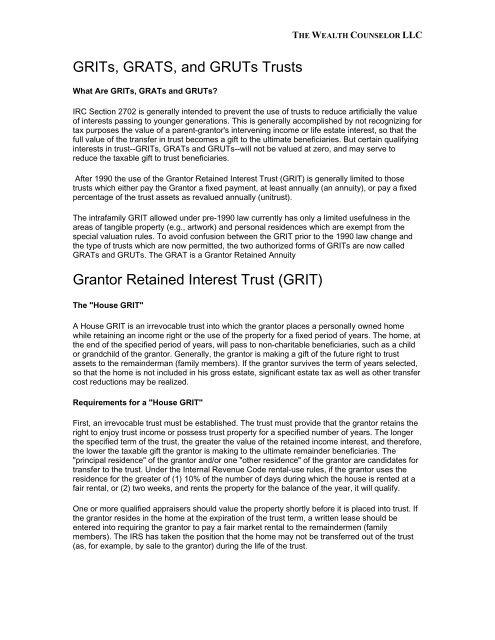GRITs, GRATS, and GRUTs Trusts - The Wealth Counselor
GRITs, GRATS, and GRUTs Trusts - The Wealth Counselor
GRITs, GRATS, and GRUTs Trusts - The Wealth Counselor
You also want an ePaper? Increase the reach of your titles
YUMPU automatically turns print PDFs into web optimized ePapers that Google loves.
<strong>GRITs</strong>, <strong>GRATS</strong>, <strong>and</strong> <strong>GRUTs</strong> <strong>Trusts</strong><br />
What Are <strong>GRITs</strong>, GRATs <strong>and</strong> <strong>GRUTs</strong>?<br />
THE WEALTH COUNSELOR LLC<br />
IRC Section 2702 is generally intended to prevent the use of trusts to reduce artificially the value<br />
of interests passing to younger generations. This is generally accomplished by not recognizing for<br />
tax purposes the value of a parent-grantor's intervening income or life estate interest, so that the<br />
full value of the transfer in trust becomes a gift to the ultimate beneficiaries. But certain qualifying<br />
interests in trust--<strong>GRITs</strong>, GRATs <strong>and</strong> <strong>GRUTs</strong>--will not be valued at zero, <strong>and</strong> may serve to<br />
reduce the taxable gift to trust beneficiaries.<br />
After 1990 the use of the Grantor Retained Interest Trust (GRIT) is generally limited to those<br />
trusts which either pay the Grantor a fixed payment, at least annually (an annuity), or pay a fixed<br />
percentage of the trust assets as revalued annually (unitrust).<br />
<strong>The</strong> intrafamily GRIT allowed under pre-1990 law currently has only a limited usefulness in the<br />
areas of tangible property (e.g., artwork) <strong>and</strong> personal residences which are exempt from the<br />
special valuation rules. To avoid confusion between the GRIT prior to the 1990 law change <strong>and</strong><br />
the type of trusts which are now permitted, the two authorized forms of <strong>GRITs</strong> are now called<br />
GRATs <strong>and</strong> <strong>GRUTs</strong>. <strong>The</strong> GRAT is a Grantor Retained Annuity<br />
Grantor Retained Interest Trust (GRIT)<br />
<strong>The</strong> "House GRIT"<br />
A House GRIT is an irrevocable trust into which the grantor places a personally owned home<br />
while retaining an income right or the use of the property for a fixed period of years. <strong>The</strong> home, at<br />
the end of the specified period of years, will pass to non-charitable beneficiaries, such as a child<br />
or gr<strong>and</strong>child of the grantor. Generally, the grantor is making a gift of the future right to trust<br />
assets to the remainderman (family members). If the grantor survives the term of years selected,<br />
so that the home is not included in his gross estate, significant estate tax as well as other transfer<br />
cost reductions may be realized.<br />
Requirements for a "House GRIT"<br />
First, an irrevocable trust must be established. <strong>The</strong> trust must provide that the grantor retains the<br />
right to enjoy trust income or possess trust property for a specified number of years. <strong>The</strong> longer<br />
the specified term of the trust, the greater the value of the retained income interest, <strong>and</strong> therefore,<br />
the lower the taxable gift the grantor is making to the ultimate remainder beneficiaries. <strong>The</strong><br />
"principal residence" of the grantor <strong>and</strong>/or one "other residence" of the grantor are c<strong>and</strong>idates for<br />
transfer to the trust. Under the Internal Revenue Code rental-use rules, if the grantor uses the<br />
residence for the greater of (1) 10% of the number of days during which the house is rented at a<br />
fair rental, or (2) two weeks, <strong>and</strong> rents the property for the balance of the year, it will qualify.<br />
One or more qualified appraisers should value the property shortly before it is placed into trust. If<br />
the grantor resides in the home at the expiration of the trust term, a written lease should be<br />
entered into requiring the grantor to pay a fair market rental to the remaindermen (family<br />
members). <strong>The</strong> IRS has taken the position that the home may not be transferred out of the trust<br />
(as, for example, by sale to the grantor) during the life of the trust.
THE WEALTH COUNSELOR LLC<br />
<strong>The</strong> trustee generally should be someone other than the grantor or the grantor's spouse. Thirdparty-owned<br />
life insurance could replace the value of the gifted personal residence without adding<br />
to the grantor's taxable estate.<br />
Grantor Retained Annuity Trust (GRAT)<br />
Grantor Retained Annuity Trust (GRAT)<br />
<strong>The</strong> cost of the transfer would be the gift tax on the value of the remainder interest. <strong>The</strong> gift is of<br />
a "future interest" <strong>and</strong> does not qualify for the annual gift tax exclusion. <strong>The</strong>refore, part of the<br />
applicable credit amount (formerly, unified credit) must be consumed.<br />
Grantor Retained Unit Trust (GRUT)<br />
Grantor Retained Unitrust (GRUT)<br />
<strong>The</strong> GRUT may be used by an estate owner to transfer assets to his or her children. <strong>The</strong> value of<br />
the transferred asset minus the value of the retained unitrust interest will equal the value of the<br />
remainder interest which is potentially subject to gift taxation. For example, if the payout rate is<br />
6%, the trustee will pay the grantor 6% of the value of the trust assets as revalued each year.<br />
Thus, if the trust assets earn more than 6%, the excess earnings will be added to principal <strong>and</strong><br />
there will be a higher dollar payment the following year.<br />
For this reason, the GRUT is not as effective as the GRAT in shifting asset appreciation to<br />
younger generations. However, for persons desiring to transfer assets to children while retaining<br />
an increasing annual return of income, the GRUT may be considered. <strong>The</strong> cost of the transfer<br />
would be the gift tax on the value of the remainder interest. <strong>The</strong> gift is of a "future interest" <strong>and</strong><br />
does not qualify for the gift tax annual exclusion. <strong>The</strong>refore, either the gift tax must be paid or part<br />
of the applicable credit amount must be consumed.


